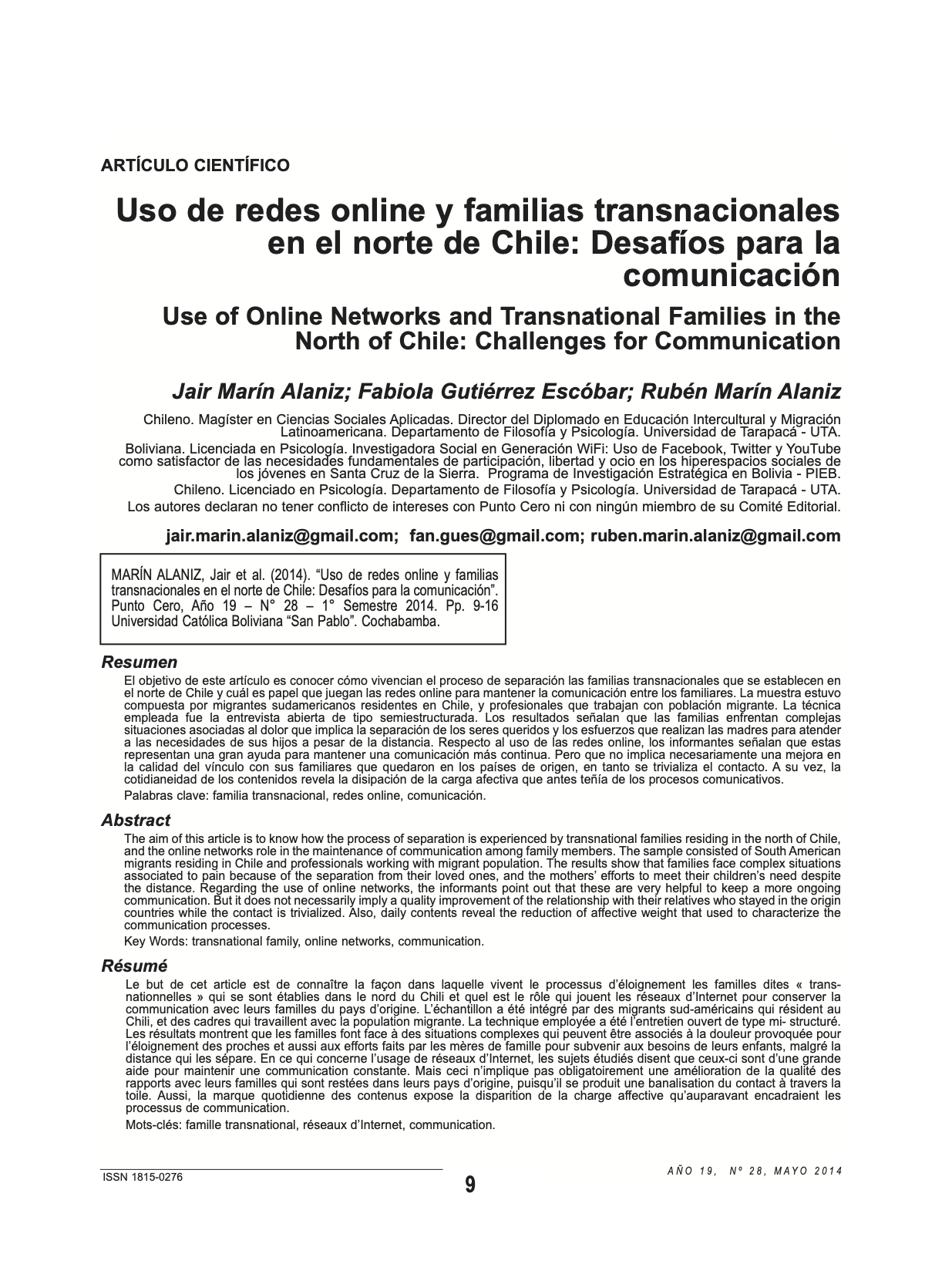Use of Online Networks and Transnational Families in the North of Chile: Challenges for Communication
DOI:
https://doi.org/10.35319/puntocero.201428124Keywords:
Transnational Family, Online Networks, CommunicationAbstract
The aim of this article is to know how the process of separation is experienced by transnational families residing in the north of Chile, and the online networks role in the maintenance of communication among family members. The sample consisted of South American migrants residing in Chile and professionals working with migrant population. The results show that families face complex situations associated to pain because of the separation from their loved ones, and the mothers’ efforts to meet their children’s need despite the distance. Regarding the use of online networks, the informants point out that these are very helpful to keep a more ongoing communication. But it does not necessarily imply a quality improvement of the relationship with their relatives who stayed in the origin countries while the contact is trivialized. Also, daily contents reveal the reduction of affective weight that used to characterize the communication processes.
References
ACHOTEGUI, Joseba (2002). La depresión en los inmigrantes: una perspectiva transcultural. Barcelona, Ediciones Mayo.
CASTELLS, Manuel et al. (2006). Comunicación móvil y sociedad. Una perspectiva global. Madrid, Ariel-Fundación Telefónica.
CASTELLS, Manuel (2001). La galaxia internet. Reflexiones sobre internet, empresa y sociedad. Barcelona, Areté.
CASTELLS, Manuel (2000). La era de la información: economía, sociedad y cultura. Volumen I: La Sociedad Red. Segunda edición. Madrid, Alianza Editorial.
CASTLES, Stephen y MILLER, Marcos (2004) La era de la migración: Movimientos internacionales de población en el mundo moderno. México, UAZ –INM
FALICOV, Celia (2007). “Working with Transnational Inmigrants: expanding meanings of family, community and cultura” en Family Process. No. 46, pp. 157-171.
FELICE, Magdalena (2013) "Perfiles de usuario: Usos y apropiaciones del teléfono celular en jóvenes de la Ciudad de Buenos Aires" en Revista Luciérnaga [En Linea] Ed. 9. 2013, Medellín, Politécnico Colombiano Jaime Isaza Cadavid, disponible en: http:www.politecnicojic.edu.edu.co/luciernaga9/pdf/usos_perfiles_espanol(si).pdf [Accesado el 15 de noviembre de 2013]
FERNANDEZ, Roberto (2006). “Investigación cualitativa y psicología social crítica en el Chile actual: Conocimientos situados y acción política” en Forum Qualitative Sozialforschung / Forum: Qualitative Social Research [En línea] Vol. 7, No. 4. 2006, disponible en http://www.qualitative-research.net/index.php/fqs/article/view/163 [Accesado el 10 de Febrero de 2013]
HONDAGNEU-SOTELO, Pierrette (1997). Latina Challenging Fronteras. New York, Routledge.
MARÍN, Jair (2012). Resiliencia escolar en niños hijos de inmigrantes residentes en el norte de Chile. Tesis de licenciatura. Chile, Departamento de Ciencias Sociales, Universidad de Tarapacá.
MARTÍN, Consuelo (2007) “Nuevas direcciones para estudios sobre familia y migraciones internacionales” en Aldea Mundo Universidad de los Andes. No. 11, pp. 55-66.
MARTÍNEZ, Jorge (2003). El encanto de los datos: sociodemografía de la inmigración en Chile según el censo de 2002. Santiago de Chile, CELADE-CEPAL.
MINISTERIO DEL INTERIOR (2009). Informe anual de extranjería y migración gobierno del interior. Santiago de Chile.
OJEDA, Norma (2005). “Familias transfronterizas y familias transnacionales: algunas reflexiones” en Migraciones Internacionales. No. 3, pp. 167-174.
PAVEZ, Iskra (2010). “Los derechos de las niñas y los niños peruanos en Chile: la infancia como un nuevo actor migratorio” en Revista Enfoques. No. 12, pp.27-51.
PEREZ, María Dolores (2008). “Mujeres inmigrantes: realidades, estereotipos y perspectivas educativas” en Revista Española de Educación Comparada. No. 14, pp.137- 175.
SUÁREZ - OROZCO, Carola. y SUÁREZ - OROZCO, Marcelo (2003). La infancia de la inmigración. Madrid, Morata.
TIJOUX, María Emilia (2013). “Niños (as) marcados por la inmigración peruana: estigma, sufrimientos, resistencias” en Convergencia, Revista de Ciencias Sociales. No. 61, pp.83-104.
TORRICO, Erik (2003). Conceptos y hechos de la “Sociedad Informacional”. Miradas desde y sobre Bolivia. Universidad Andina Simón Bolívar, La Paz.
VERA, José (2007). “Condiciones psicosociales de los niños y sus familias migrantes en los campos agrícolas del noreste de México” en Intercontinental de Psicología y Educación. No. 9, pp. 21- 48.

Downloads
Published
How to Cite
Issue
Section
License
Copyright (c) 2014 Revista Punto Cero

This work is licensed under a Creative Commons Attribution-NonCommercial 4.0 International License.








